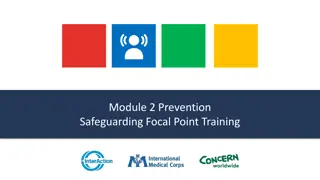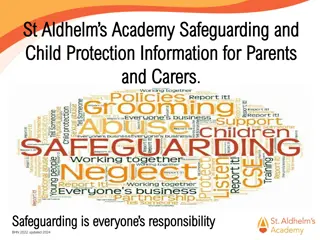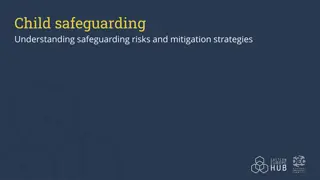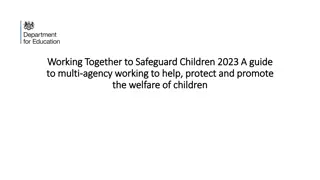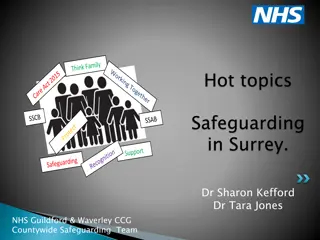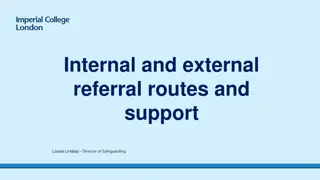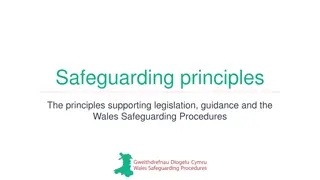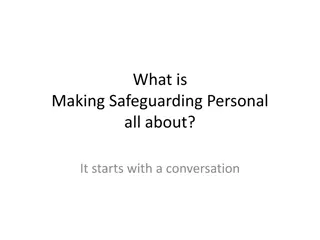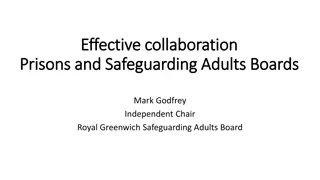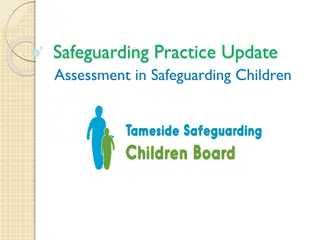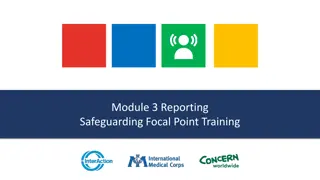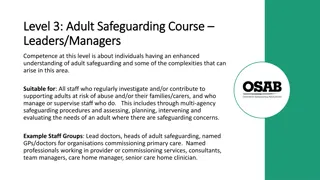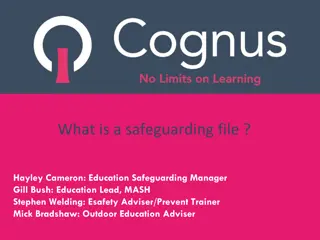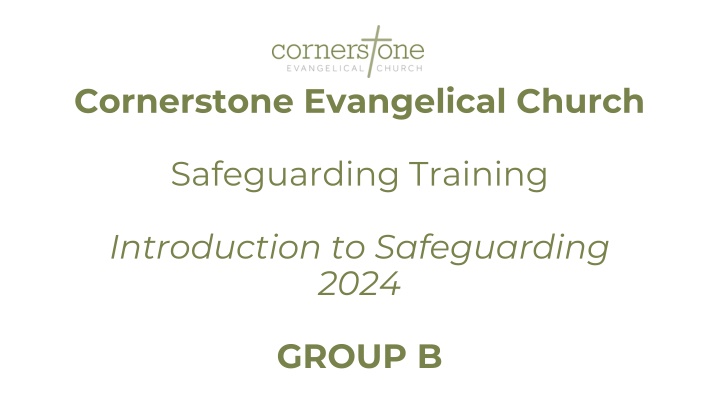
Safeguarding Training and Practices at Cornerstone Evangelical Church
Explore the comprehensive safeguarding training program at Cornerstone Evangelical Church in 2024, covering key practices, team members, policies, values, governance, and organizational culture to ensure a safe environment for all. Safeguarding is emphasized as everyone's responsibility within a child-centered approach.
Download Presentation

Please find below an Image/Link to download the presentation.
The content on the website is provided AS IS for your information and personal use only. It may not be sold, licensed, or shared on other websites without obtaining consent from the author. If you encounter any issues during the download, it is possible that the publisher has removed the file from their server.
You are allowed to download the files provided on this website for personal or commercial use, subject to the condition that they are used lawfully. All files are the property of their respective owners.
The content on the website is provided AS IS for your information and personal use only. It may not be sold, licensed, or shared on other websites without obtaining consent from the author.
E N D
Presentation Transcript
Cornerstone Evangelical Church Safeguarding Training Introduction to Safeguarding 2024 GROUP B
Group B Training Group B training is split into three parts. We are asking all volunteers in Group B to: 1. Complete a national course developed by Social Care Wales to raise general awareness of safeguarding principles and procedures in Wales. 2. Go through the rest of this PowerPoint for a detailed understanding of how these apply in Cornerstone. 3. If you are able, attend an in-person session on Thursday 21st November to discuss scenarios and to ask questions.
Part 1: Please follow the link below to complete the national Wales training: https://socialcare.wales/learning- modules/group-a-safeguarding Once completed, please send your certificate to admin@abercec.org.uk Then move on to the rest of the slides to learn more about how we do things in Cornerstone.
Part 2 Cornerstone Safeguarding Practice and Procedures
Cornerstone Safeguarding team Emily Phillips Children, Families & Youth Worker Martin Brown Designated Safeguarding Trustee (DST) Jan Llewellyn Designated Safeguarding Lead (DSL) David Johns Deputy Designated Safeguarding Lead (DDSL) Full contact details on www.abercec.org.uk/safeguarding
Cornerstone has a Safeguarding Policy which is reviewed annually, based on: Wales Safeguarding Procedures and guidelines from: thirtyone:eight The policy can be found at: www.abercec.org.uk/safeguarding
Values Cornerstone has two key values in Safeguarding Practice: 1. Safeguarding is everyone's responsibility. 2. The approach should always be child- centred/person-centred.
Governance Good governance helps an organisation prevent abuse and means it can respond quickly and with integrity when concerns arise. Central to this, is the Board of Trustees.
Culture Having a safe and healthy culture creates good attitudes towards safeguarding and ensures it is taken seriously by all. The culture of an organisation sets the tone for safeguarding.
Thirtyone:eight Culture Video If the video doesn't play, please follow this link: https://youtu.be/VBGg4CKgX2Y
Safer Recruitment All our volunteers and staff working with children or adults follow a safer recruitment process to ensure they are suitable. Anyone who wants to volunteer with a relevant ministry must follow this process. It is set out in our Policy s Practice Guidelines (Appendix 1).
Recruitment Checklist Also available on www.abercec.org.uk/safeguarding
Training and awareness At Cornerstone, all our volunteers who work with children and adults, our deacons and our employees are required to undertake annual safeguarding training. Trustees/Elders and Designated Safeguarding people are required to undertake training that is role and responsibility specific. Safeguarding training equips and empowers everyone to know, understand, and have confidence in how to respond well to safeguarding issues. Raising awareness at all levels helps to make children, young people and adults at risk of abuse, neglect or harm aware of how to ask for help if they are worried or have concerns.
We have Practice Guidelines that outline safe working practices to help us run activities safely, develop healthy relationships and minimise the risk of false accusation. The guidelines and policies are on the website and cover subjects such: Online and digital communication Transport Pastoral visiting Discipline Dealing with bullying First Aid Go to www.abercec.org.uk/safeguarding and download Appendix 1.
Managing Workers In every organisation open to or likely to have contact with children, young people and adults, all workers, paid and voluntary, should be appropriately managed, supervised and supported in their role.
Code of Conduct We have a Code of Conduct which provides guidance on what we expect from our volunteer and paid workers. All workers should be supervised or guided by a named individual. Good communication between worker and supervisor is essential.
Ministry Leads Ministry Area Ministry Lead Childrens worker with overall responsibility for all children s work Emily Phillips Children s worker (Pebbles) Cornerstone Kids + Go Wild Creche Open the Book The Welcome on Friday The Welcome on Weds (craft) Pastoral Care Debbie Askew Emily Phillips Anthea Price Judy Moreland Anthea Price Sarah Langton Andrew Cottom
Partnership Working When working in partnership with other organisations, either as a one-off or in the longer term, it's important to make sure that they hold the same safeguarding standards as our organisation.
Responding to Concerns Even if you do not work directly with children and adults, you could still spot something that causes concern or makes you feel uncomfortable. Responding well to concerns means that people can be protected from harm and action taken to stop abuse.
Five steps to responding well Recognise that a person may be at risk of harm or abuse. Respond by taking appropriate action in a sensitive and timely way. Record the concerns or disclosures of abuse that have been made. Report any concerns to the right person so action can be taken. Reflect on what happened and act on any learning
A Worker should: Remain calm, listen well and show acceptance Don t ask questions, listen carefully Allow time for the child/adult to speak Be non-judgmental Be neutral and non committal in response Reassure Say that the information will be shared with a limited number of people who will be able to help Make careful notes as soon as possible Inform the Designated Safeguarding Lead
Abuse suspected or disclosed Is the person in immediate danger? YES NO Contact relevant emergency service Contact Designated Safeguarding Lead or Deputy Safeguarding Lead Contact Designated Safeguarding Lead or Deputy Safeguarding Lead
When a concern is raised: Report any concerns to Jan Llewellyn, Designated Safeguarding Lead (DSL), as soon as possible. If the DSL is not available, then make the report to the Deputy DSL, David Johns or Martin Brown(DSTrustee). If the Designated Safeguarding people can't be contacted and the issue needs urgent action, report any concerns to the Police or Social Services e.g. If it is unsafe for a person to go home
Report Form Available on www.abercec.org.uk/safeguarding This form should be completed within 24 hours It must be handwritten and then handed to the Designated Safeguarding Lead. Use their own words as much as possible in the report. Include observations of their behaviour if appropriate.
If the suspicions implicate both the Safeguarding Lead and the Deputy, then the report should be made in the first instance to: Gwent Safeguarding Board Tel: 0800 328 4432 Alternatively contact the police.
Next steps Thank you for completing the Cornerstone Safeguarding Training for Group B. Download the Wales Safeguarding Procedures App (free from App store or Google) onto your phone for quick and easy access. Familiarise yourself with the Cornerstone Safeguarding webpage so you know where to find the policy, appendices and forms you may need to fill in. Fill in the short form on the link to let us know you have completed the training: https://forms.gle/WjdZw6VfPHmtF73t6
In-person training If you are able, please come along to an in-person session on Thursday 21st November at 7pm where you will have an opportunity to ask any questions, and discuss scenarios. Sign up at: https://abercec.churchsuite.com/events/npu1kh7b
Prayer Loving God, we pray that this church may be a place of welcome, security and compassion. Keep us watchful yet caring, trusting yet ready to question, that all who worship here may do so in safety and in the knowledge of your love; through Jesus Christ our Lord.

